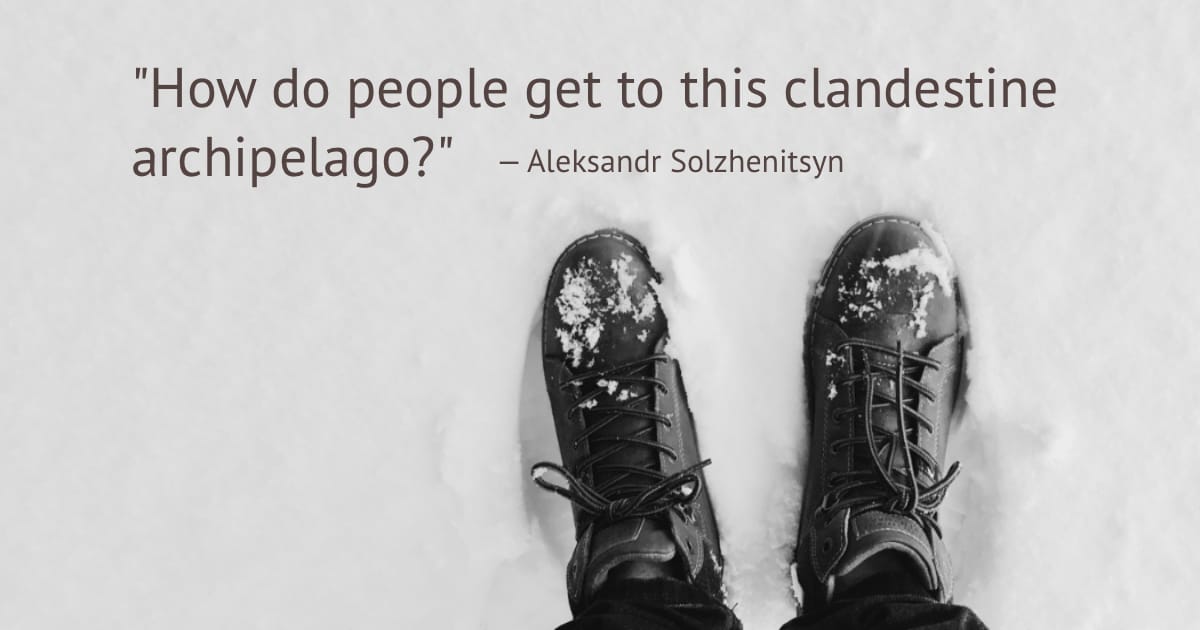Could a government fail this badly?
The word ‘archipelago’ conjures up images of a restful vacation. The scattered islands of the Aegean Sea are one such setting. People want to go there. And so we realize this oddly poetic title, The Gulag Archipelago, is laced with sarcasm. Solzhenitsyn was not sent on vacation by his utopian government, the Soviet Union. He and his fellow citizens were not protected, supported, nor empowered. At least eighteen million of them were, by the weakest of connections or for no reason at all, branded as enemies. They were arrested, coerced to confess, sentenced to a prison term that was often fatal, or simply shot. Who would be next?
These events happened between 1918 and 1956. “A long time ago. Is this important today?” Good question. If you have a deep interest in justice, if you’re concerned about the use of government power (and abuse of it), and if you’re inspired by people overcoming incredible obstacles to survive, this book is an essential read.
The Gulag Archipelago is billed as a “literary investigation” by Alexsandr Solzhenitsyn. One wonders, what is literary about recounting Soviet atrocities? As we read on, we learn it isn’t a pretentious message. Solzhenitsyn has a grander reason for writing this book, and it is an investigation, not about the Soviets but their victims.
In The Gulag Archipelago, Solzhenitsyn uses his own experience, and those of 227 others, to illustrate the abject cruelty and farcical lawlessness under Joseph Stalin. It’s not a retelling of war crimes, but crimes on civilians. The Soviet regime perpetrated its worst offenses not against foreign soldiers, but against its own weak and defenseless population. A citizen was destroyed by the whims of the State.
The final destination for these citizens? One of the many secret Soviet prisons hidden throughout the country, an ‘archipelago’ of deadly gulags. It takes a compassionate writer to make tolerable this clinical recounting of barbarism. Solzhenitsyn is morally outraged. The heat he shows over these events fills the bleak subject of his book with a humanistic warmth. And since he was one of the regime’s prisoners, Solzhenitsyn speaks with an authority no paid journalist could match.
If you have a deep interest in justice… this book is an essential read.
“How do people get to this clandestine archipelago?” So Solzhenitsyn begins his long history. The question shows dark humor in a book that will, in fact, make sensitive readers cry. No one wants to travel to a gulag. However, if the government is spending its time creating these gulags, clearly they are necessary? It’s the way of communism. The government knows best. It can behave inhumanly, viciously, but it is always right.
The narrative is framed as a journey to prison. Solzhenitsyn begins with the cycle of arrest, the judicial processing, travel to the gulag, and onto prison life that was short for many. Readers will learn methodical details of the gulag system. Why learn this? Solzhenitsyn might say, to be a witness to history. If they could endure this brutal treatment, certainly we can endure hearing about it, to validate their experience as part of the human record, and to regard this lesson for our own generation.
Few readers can comprehend life in an all-pervasive police state. And so, we learn harrowing details of midnight arrests, copious methods of torture, appalling prison conditions, and barbaric methods of transport, including weeks of being shuttled in unheated box cars across Siberia in summer clothes. (You wore what you had on at the time of your arrest. Those arrested in summer were ill-prepared for winter.)
You wore what you had on at the time of your arrest. Those arrested in summer were ill-prepared for winter.
Solzhenitsyn evokes the stifling atmosphere of Soviet prison. Inmates were often fed gruel and meager bread in meager amounts, often with no bowl given. (Prisoners would fold the gruel into the lapels of their coats). Lice feasted on their flesh, and the bedbugs would descend from the ceiling in broad daylight to feed on overpacked prison cells. A holding cell meant for twelve could be filled with three hundred prisoners. A cell designed for a single person could house thirty-five. Solzhenitsyn includes the problems of sleep and sanitation when prisoners could barely move, and what inmates did with the bodies of the dead before they were removed by the guards.
We’re reminded often, most of these victims were ordinary people. Part of the intelligentsia, they were educated, productive, and independent. Solzhenitsyn himself was a decorated Red army commander with battle experience. After critiquing Stalin in a letter to a friend, Solzhenitsyn was removed from his post in the midst of World War II. He viewed the end-of-war celebration from a prison cell window. Solzhenitsyn had been fighting for Soviet Russia, for Stalin. His eyes were opened.
Was the gulag system corrective? These prisons weren’t for rehabilitation or even punishment. Gulag was for crushing people. If an inmate survived his or her ‘tenner’, later extended to twenty-five years for a single infraction, the State only hoped the released prisoner was sufficiently broken by the experience, unable to cause future trouble.
The prisons weren’t for rehabilitation or even punishment. Gulag was for crushing people.
The sheer and utter waste of the gulag system was hard to fathom. Western governments could not accept that a world power would destroy its own society. Indeed, at the time this was happening, some in the West struggled to accept reports the USSR was arresting its own population en masse. “Why would they?” Western powers employed their own principled reasoning to understand the Soviets. They couldn’t fathom a government would steal, beat, and enslave for profit.
One such example was the infamous ‘show trials’ of the 1930s. At Stalin’s request, many high-ranking Soviet officials were accused of treason and purged from the communist party. The accused were coerced into making public confessions, often reading mawkish statements written by their interrogators. Certain western journalists accepted this PR maneuver as legitimate because the defendants didn’t have to confess, did they? How could the majestic Soviet Union, a founding member of the United Nations, and later a nuclear superpower, behave like a criminal enterprise? It made no sense, did it?
Our view of 20th-century communist regimes is almost patronizing. In school, American children learned about the backward, incompetent USSR. However, there was a clever, savage logic to Stalin’s actions. Stalin purged the ranks to stave off a coup that he richly deserved. He had taken the country by force and ruled only by fear. His leadership was always tenuous. Stalin lived a very long time, dying in 1953. It appears his plan worked.
The other motivation for gulag was financial. The so-called incorrigibles, whom Stalin rounded up and sent to dilapidated prisons, were used as slave labor for public works projects. They built railroads in remote areas in the dead of winter. They were counted on to repay Stalin with their health and often their lives. Many prisoners had nothing to offer except a pair of hands. They were assigned backbreaking work in harsh conditions and died quickly, only to be replaced by the newly-arrested.
How could the majestic Soviet Union, a founding member of the UN… behave like a criminal enterprise?
By a work of Providence, Solzhenitsyn was spared this fate. The gulag leaders asked if he had any special skills. Solzhenitsyn promoted himself as a nuclear physicist! The Soviets, quite ignorantly, assigned him to a scientific laboratory for political prisoners, not a camp for hardened criminals. Solzhenitsyn credits this transfer for saving his life.
The gulag program existed in the USSR for nearly thirty years. One may wonder why no resistance was mounted over this internal genocide, why no revolution took place. Quite the opposite. Citizens complied, each hoping to be spared a well-known fate. Solzhenitsyn marvels at the inaction of his own people, and himself, when faced with an unjust arrest. “Why didn’t you resist? Yes, resistance should have begun right there, at the moment of the arrest itself. But it did not begin.”
A reader today does not question this compliance, given Stalin’s merciless regime. Solzhenitsyn describes the shock of being arrested, the indignity. “In one moment, all the customs and habits of human intercourse you have lived with all your life have broken down.” You weren’t thinking straight. It’s what Stalin counted on.
The long history of gulags in his home country infuriates Solzhenitsyn. The Russian culture, renowned for art, music, ballet, literature, and the unmatched resiliency of its people, lost its 20th century. A government is established to enrich citizens’ lives, not to be the instrument of their deaths. And yet Solzhenitsyn knows, a government is rarely held accountable. He’s not an idealist. He didn’t write The Gulag Archipelago to shame the political criminals responsible. It would be a much less powerful book if he had.
For him, it’s about the victims. In 1958, when Solzhenitsyn began to write this chronicle, those imprisoned and killed by the Soviets were unknown, anonymous, forgotten. There was no recognition, let alone justice. Solzhenitsyn aimed to change that. He dedicates Volume 1 of his series “to all those who did not live to tell it. And may they please forgive me for not having seen it all, nor remembered it all, for not having divined all of it.”
Solzhenitsyn marvels at the inaction of his own people, and himself… “Why didn’t you resist?”
The Gulag Archipelago is a three-volume set. There was a lot to record over 30 years.
We’re not ignorant of the evils that governments do. In fact, a reader could miss the achievement of The Gulag Archipelago. In the West, investigative reporting is nearly a birthright. The information Solzhenitsyn collected by himself we have an army of reporters to gather. “We hear about abuses. A Soviet-style Gulag couldn’t happen.”
“Gulag” is an acronym, Glavnoe Upravlenie Lagerei. Translated, it means “Main Camp Administration.” Would this bland name raise eyebrows today?







